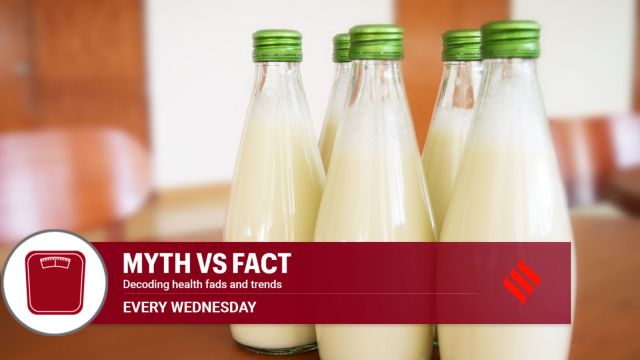- India
- International
Can drinking milk lower your calcium levels and weaken your bones? Here’s the truth behind Maneka Gandhi video
Dr Priyanka Rohatgi, Chief Nutritionist, Apollo Hospitals, busts an online myth and explains why milk is still needed for a balanced diet
 Fresh milk contains no lactic acid. (Photo Credit: Canva/Representative)
Fresh milk contains no lactic acid. (Photo Credit: Canva/Representative)Is drinking milk depleting you of calcium instead of building its reserves? A recent video of BJP leader Maneka Gandhi, where she can be heard saying that people who drink the most milk have the least amount of calcium, is doing the rounds on social media. She argues that it leads to lactic acid build-up which the body tries to neutralise by drawing on calcium and other buffering agents from the bones, weakening them.
However, such sweeping generalisations cannot be made about milk, which anyway has very low levels of lactic acid, according to Dr Priyanka Rohatgi, Chief Nutritionist, Apollo Hospitals. “This can happen rarely among those who are lactose-intolerant and have very low levels of lactase, the enzyme that digests milk. This happens when there are underlying health conditions that impair the body’s ability to regulate acid-base balance,” she adds. Except for people with certain digestive conditions and sensitivities, Rohatgi says milk is a good protein source of a balanced diet and can be consumed as butter, paneer, cheese and curd.
What is lactic acid? Does milk contain lactic acid?
Lactic acid is a chemical your body produces when your cells break down carbohydrates for energy. Fresh milk contains no lactic acid. In other kinds, the amount present is not over about 0.002 per cent. Lactic acid is naturally present in the body in small amounts and is not harmful. There can be potential health issues in individuals with lactose intolerance, who consume large amounts of lactose-containing dairy products. This group may be at the risk of developing lactic acidosis, a type of metabolic acidosis that occurs when lactic acids build up in your blood.
Is the lactase, the enzyme that digests milk, not enough in human beings?
The enzyme lactase is present in our small intestine. Between childhood and adulthood, there is a good amount of lactase present in our bodies to digest cow or buffalo milk. As we age, the lactase production dips. That’s why the elderly have difficulty digesting milk. When we have dairy in the form of curd or butter milk, where lactose is fermented into lactic acid, then it could actually be absorbed very well.
Does lactose convert into lactic acid in the body leading to bone demineralisation?
The information about lactic acid being converted in the body from lactose is incorrect because lactic acid is a fermented form of lactose, which is readily bioavailable in the body in small amounts. You could find it in fermented food like curd, cheese, butter milk and it is better absorbed in the body so it does not really alter your acidic levels.

If you are lactose intolerant you would immediately have bloating, burping and gas. You may have diarrhoea or loose stools but demineralisation and remineralisation are regular processes which happen in the body. Even if there is demineralisation, the body can remineralise with a fresh intake of nutrients.
Is milk a good source of calcium?
Milk is an excellent source of calcium, with one cup (240 ml) of cow’s milk providing approximately 300 mg of calcium, which is about 30 per cent of the recommended daily intake for adults. The calcium in milk is highly bioavailable, meaning it can be easily absorbed and utilised by the body. Regular consumption of milk and dairy products has been associated with higher bone mineral density and a reduced risk of osteoporosis and fractures.
However, it’s important to note that excessive intake of milk or dairy products can potentially lead to other health concerns, such as weight gain or digestive issues for those with lactose intolerance or milk allergies. Moderation and a balanced diet are recommended to maintain optimal calcium levels and bone health.
Apr 05: Latest News
- 01
- 02
- 03
- 04
- 05





























